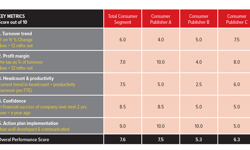Advertisers targetting overseas markets are not getting a good deal from the UK B2B publishing sector. Too many publishers are cynically adding overseas "readers" to their lists and then making negligible effort to qualify or maintain the lists properly.
We did a random survey of 13 ABC certificates of publications with the word "international" in their title. Whilst perhaps not the most scientific methodology the findings rang familiar bells. When we totalled up the different circulations we found that an average of 44% of the circulations were non controlled and a depressingly high 30% in the graveyard slot of non controlled.
The whiff of expediency was choking. It is clear that too many overseas circulations are culled from directories or exhibition attendance lists, dumped on the circulation list and then never communicated with again; certainly nothing in the way of conversion or registration programmes. These involuntary recipients might start off life in the semi-respectable position of "controlled non-requested" but soon slip unnoticed and unmourned into the oblivion that is non-controlled. Either way it is extremely likely that many of the copies destined for overseas readers never actually see life beyond their polywrap.
The bottom line "net circulation" figure is all that seems to matter. Despite the advertising downturn there are still clearly advertisers who will assume that because X number of copies are printed (fact) and X number of copies are being sent overseas (fact) that those copies are being read (dream on).
There are two possible solutions to this. The first would be the most effective but is the least likely to happen:- namely advertisers learning how to interpret the circulation certificates. The second is publishers waking up to the opportunities to be gained from doing the circulation job properly. Equally unlikely?
Marketing personnel must get their way
Martin Rosen, managing director of subscriptions bureau Publishing Power, thinks there are a number of reasons behind our indifference to our overseas recipients: our inability to adapt to cultural differences, unwillingness to focus on the nitty gritty detail of international marketing and the misuse of marketing staff. He also throws in muddled thinking, arrogance, fear and good old-fashioned xenophobia for good measure.
He recalls how one UK publisher with a small, but significant US subs base wanted to disguise the UK origins of the magazine to the US readership. He thought this would be best achieved by dropping sterling as one of the payment currencies. All this did was alienate the UK readership and probably went unnoticed in the USA. A far better way of buttering up their US subscribers would have been to introduce a domestic return address and freephone number for the US; both of which are seen as the norm for US publications.
The kind of initiatives that are needed will only come from marketing staff, yet too many publishers are failing to get the best out of their valuable marketing teams. Too many marketers spend their time being asked to jump through statistical hoops, proving their worth by the volume of numbers they can crunch in the week. Why not give them the time and resources to think of creative solutions.
For Martin Rosen there is only one big question in publishing: "Does the product suit the market?" After that, everything else is in the detail. Furthermore effective international marketing is not magic – it is just a question of focusing on the detail – "the minutiae matters".
The language barrier
Take language as one key area. Too few publishers bother to translate their marketing material into local language, thinking that since the publication is an English language one there is nothing to be gained by promoting in foreign languages. Martin’s theory is that, whilst overseas readers are prepared to subscribe to English language titles, they often respond better when marketed to in their own language.
Take renewals / re-registrations for example. Ten or so years ago, producing foreign language mailers was a high maintenance, high cost activity. Different letterhead had to be pre-printed and stored, fulfilment systems had less sophisticated extraction routines making it difficult to cleanly identify overseas readers and mailing options were limited.
Now, publishers are spoilt for choice. All bar the most basic of fulfilment systems will allow you to segment your overseas renewals, report writing packages such as Crystal Reports allow you to change letter text without even changing the paper and "cheap" translation services are easily available. Overseas consolidators can offer the most cost effective mailing options and even in many cases handle the letter printing themselves.
All of this means that publishers can talk to their readers in, what Martin Rosen calls, their "language of comfort" as opposed to their "language of business". He is convinced that this not only increases response rates, but for areas such as renewals, that readers respond to the earlier efforts thereby decreasing fulfilment costs and increasing RoI.
Whilst the UK and US are very slow to take onboard cultural differences and work them to their advantage, the French and in particular the Germans are much more receptive. This is nothing to do with ability, they just seem to be born with a more ingrained understanding of the fact that we are live in a multi-cultural world.
The magazine AutoTechnology, published by the German company GWV Fachverlage, has worked closely with Publishing Power to incorporate greater use of language in their controlled circulation marketing.
On their web site the registration page is now offered in four languages (English, German, French and Spanish) with entry via "flag buttons". On the different registration pages the standard registration form with demographic questions has been given an intelligent (not literal) translation. Not only does the reader feel more comfortable when the sometimes esoteric questioning that appears on a registration page is presented in their own language but the quality of the demographic information is considerably improved by removing any potential for misunderstanding.
Resist the temptation to hand the translation over to the fresh faced graduate trainee. An overly literal translation could mislead and exacerbate rather than help the situation.
Publishing Power and AutoTechnology have extended the process beyond the initial registration to include re-registration. By recording which "language option" the reader selected when first registering, the reader can be sent a re-registration email in their own language with a hyperlink taking them straight to their reader details on a page in their own language. The magazine is boasting a 80% re-registration rate on these campaigns.
Such is the success of the efforts to capitalise on "language of comfort" that Publishing Power is trying to intelligently "guess" the likely language of those people who have registered via other channels, so that they can be included in these highly effective re-registration campaigns. They are in the process of developing rules (based on "country of origin" and "first name" – eg if country of origin is France and first name is Pierre – then assume French) and have yet to roll this out, but are very confident of the underlying principles.
As Martin Rosen would be the first to admit, none of this is rocket science – it is simply a question of a publishing company reaping the benefits of doing the simple things right.
FEATURE
Little England?
InCirculation takes a gloomy view of the state of our international marketing and solicits the views of Martin Rosen, managing director of subscriptions bureau Publishing Power.










